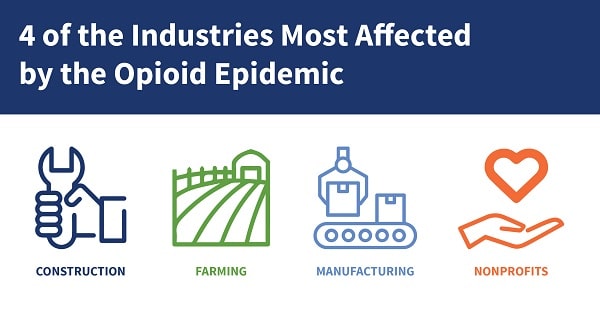The opioid epidemic began in the late 1990s, when healthcare providers began prescribing opioids at higher rates than ever before. Back then, pharmaceutical companies assured the medical community that these medications were not addictive, a misconception that led to extensive misuse of both prescription and non-prescription opioids. In 2017, the U.S. Department of Health and Human Services (HHS) declared the opioid epidemic a
public health emergency, and announced a five-point strategy to address the crisis.

As the opioid epidemic continues to affect the lives of families and communities across the country, it’s important to also look at the impact it has had on the U.S. workforce.
Opioids in the Workplace: The Impact on Workers’ Comp Claims
According to AmTrust’s Matt Zender, SVP overseeing the workers’ compensation product, the opioid epidemic is an issue that has those in the
workers’ comp space concerned. Additionally, Dr. Melissa Burke, Head of AmTrust’s Managed Care and Clinical, says “Many workplace injuries lead to chronic pain and the ongoing use of opioids to mask that pain. Chronic use of opioids may lead to polypharmacy to treat the many side effects associated with opioid use, potentially additional comorbidities, depression, anxiety and of course the risk of overdose.”
It’s clear that measures need to be taken to address the opioid epidemic and the toll it is taking on both large and small businesses. An employer’s workers’ comp program should address the crisis directly to help reduce the risk of abuse and the cycle of addiction. In many cases, there could be
safer treatment alternatives to opioids to consider.

The opioid epidemic continues to be a
growing concern for employers of all sizes throughout the country. In fact, a survey from the
National Safety Council (NSC) reports more than 70 percent of employers state that opioids affect their workplace. Missed work, drug use while on the clock, decreased job performance,
near miss injuries and on-the-job injuries are just a few of the ways the opioid epidemic impacts employers.
Some industries, however, are more affected by the crisis than others. These include:
1. Construction
The construction industry has experienced the brunt of the opioid epidemic, most likely due to the physical nature of the job. A study from the
Midwest Economic Policy Institute discovered that the injury rate for construction workers is 77 percent higher than the national average for other occupations. Of the Midwestern States reviewed in the study, as many as 60 to 80 percent of the workers’ compensation claims in the construction industry involved opioid prescriptions for injuries incurred on the job.
2. Farming
Rural America feels the toll of the opioid crisis, with farmworkers and ranchers hit especially hard. According to the
American Farm Bureau Federation, 74 percent of farmers and farmworkers report they are directly affected by opioids. Additionally, the CDC reports that the drug overdose death rate is actually higher in rural areas than it is in urban regions. The problem may lie in the fact that while it is easy to access a large amount of opioids in these rural communities, it’s much harder to find access to treatment and services for addiction.

3. Manufacturing
In the next decade,
two million manufacturing jobs are expected to go unfilled, as opioid use and a declining workforce have become more prevalent. Many of these manufacturing jobs are safety-critical roles and require pre-employment and random drug testing, but it’s becoming difficult to find qualified candidates who can pass these drug tests. With jobs left unfilled, both productivity and growth will suffer for these employers.
4. Nonprofits
While employers throughout the country deal with drug abuse and addiction in the workplace,
nonprofit organizations are tasked with the additional challenges of increased intake volumes as a result of the epidemic – often without corresponding increases in budget or staffing. The foster care system and drug treatment facilities have been significantly impacted, as the lack of adequate workers or funding leads to the inability to properly provide for each client and greater exposures to risk.
AmTrust Financial Works to Reduce Opioid Prescriptions for Workers’ Comp Claims
Through our partnership with Optum Workers' Comp and Auto No-Fault, a pharmacy care management company, we have implemented processes that
reduce overall opioid prescriptions to our insureds’ injured employees. Launched in 2018, nurses now review all prescriptions that require prior authorization, and the initiative has already prevented nearly 13,000 prescriptions that could have been deemed unsafe. Additionally, AmTrust has the resources and insight to create customized
workers’ compensation coverage plans for every customer.
For more information about our
small business insurance solutions, please
contact us today.
 This material is for informational purposes only and is not legal or business advice. Neither AmTrust Financial Services, Inc. nor any of its subsidiaries or affiliates represents or warrants that the information contained herein is appropriate or suitable for any specific business or legal purpose. Readers seeking resolution of specific questions should consult their business and/or legal advisors. Coverages may vary by location. Contact your local RSM for more information.
This material is for informational purposes only and is not legal or business advice. Neither AmTrust Financial Services, Inc. nor any of its subsidiaries or affiliates represents or warrants that the information contained herein is appropriate or suitable for any specific business or legal purpose. Readers seeking resolution of specific questions should consult their business and/or legal advisors. Coverages may vary by location. Contact your local RSM for more information.